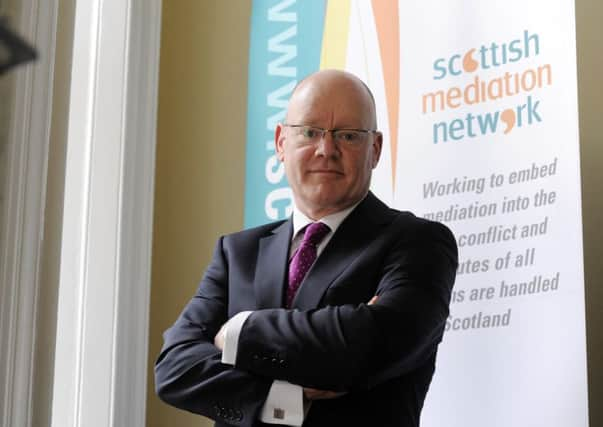Graham Boyack: University clinic marks 100th mediation


On Scotland’s election day I was delighted to attend a celebration of the University of Strathclyde Mediation Clinic’s 100th mediation. This is quite a remarkable achievement for the Clinic as their first mediation took place in October 2012.
The Clinic provides a mediation service on a pro-bono basis, the majority of cases coming from the Small Claims Court at Glasgow Sheriff Court and, more recently, the Clinic is now also operating at Lanark Sheriff Court. It provides an opportunity for students on the post graduate courses in Mediation and Conflict Resolution to go beyond the theory and to practice mediation in live cases, supported by experienced mediators drawn from the Scottish Mediation Register.
Advertisement
Hide AdAdvertisement
Hide AdBy the end of 2015, of the small claims dealt with, 63% had reached full agreement (many subsequently settle as a result of mediation) and, of those cases, the settlement terms of 81% had been fulfilled (this compliance percentage is higher than for small claims dealt with by the Court). The higher rate of compliance through mediation is also the experience of mediations in the Edinburgh Sheriff Court and is put down to the involvement of all of the parties agreeing the way forward, rather than a ruling being made by the Court.
At the celebration the keynote speaker was Sheriff Anwar who presides at Glasgow Sheriff Court and is often presiding when the small claims cases are dealt with on a Friday afternoon. She said that she very much welcomed the mediation service being available and that it showed “impressive statistics” and was “appreciated by the Court users and Sheriffs”.
The Sheriff outlined that sometimes parties are initially reticent to use mediation but that after a five minute chat with the mediators, any fears can be allayed. Having that discussion also gives parties the opportunity to go to mediation without it seeming to be a sign of weakness in their case. The role of the Sheriff was described as that of seeking to negotiate a settlement between the parties, identifying facts and legal issues and when many self-represented parties arrive with a raft of information a conversation through mediation may be a more appropriate way of discussing the issues and ensuring that the parties are heard. As is often the case at such a celebration event, attention turns to what next. Sheriff Anwar said she was hopeful that mediation would form a formal part of the new simple procedure process being discussed by the Scottish Civil Justice Council for introduction into the Scottish Courts.
That is a view shared by the Scottish Mediation Network and we passionately believe that there is a great opportunity to take the experience of the University of Strathclyde Clinic, that of the Edinburgh Sheriff Court and of work that we have carried out at Airdrie Sheriff Court and to make mediation an integral part of the court system across Scotland.
In order to do that one of the key aspects that needs to be dealt with is that currently all these services are run on a pro-bono basis. Whilst saluting the mediators for volunteering their services, it does not seem an appropriate way to be providing a civil justice system in Scotland.
Apart from providing a different way for people to resolve their disputes, there are a number of benefits of having mediation as an option for parties in the Courts across Scotland.
• Graham Boyack is director of the Scottish Mediation Network